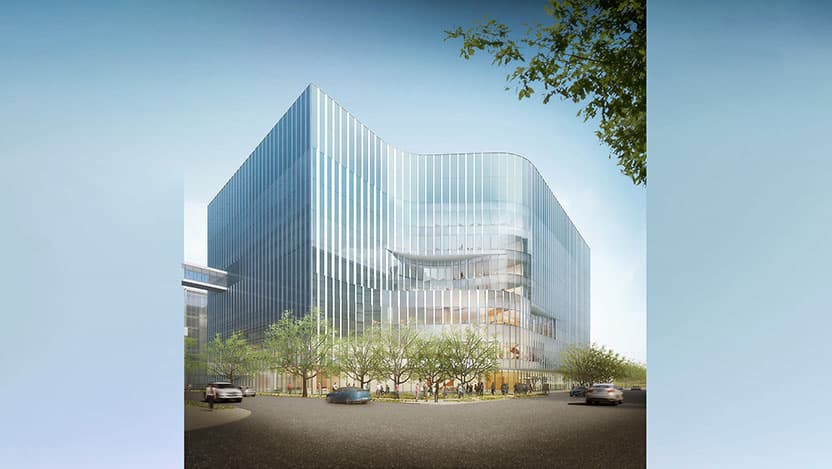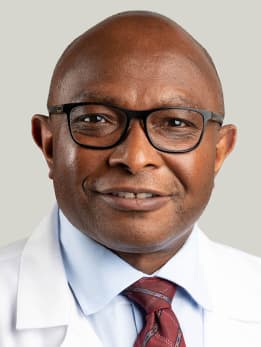State approves UChicago Medicine’s $815M plan to build city's first freestanding cancer care and research facility

The Illinois Health Facilities and Services Review Board approved the University of Chicago Medicine’s plans to build an $815 million, 575,000-square-foot building dedicated to cancer research and care on its medical campus on the city’s South Side.
The freestanding cancer pavilion — the first of its kind in Chicago — represents one of the largest investments made by the academic health system for patients and the community. It builds off the University of Chicago’s long history in cancer innovation and strengths in cancer care. With inpatient and outpatient services, the cancer center will become the hub of the health system’s efforts to advance cancer care and accelerate the pipeline of scientific discoveries and clinical innovation, consolidating services that are now spread across at least five buildings on UChicago Medicine’s campus in the Hyde Park neighborhood of the South Side.
“This world-class facility reflects our academic medicine mission of serving our community and patients by providing exceptional care driven by cutting-edge research,” said Mark Anderson, MD, PhD, Executive Vice President for Medical Affairs at the University of Chicago. “This will allow our teams of scientists, physicians and nurses to bring the latest technologies and advancements in cancer prevention, care and therapies to patients, while working in parallel to better understand the disease, improve outcomes and drive for a cure.”
The cancer pavilion will include the addition of 80 inpatient beds. These beds will be dedicated to patients with cancer, allowing UChicago Medicine to open other beds for patients with complex or acute care needs in areas such as organ transplants, digestive diseases, cardiology, orthopedics and trauma care. This, in turn, will help address some of the capacity constraints for the medical center, whose beds are full most days of the year.
“This size and investment speak to an important aspect of this project, which is increasing access to all the various services and programs to meet the growing needs of patients and the community,” said health system President Tom Jackiewicz. “We are also deliberately designing this facility so that we can tackle cancer’s toughest challenges in a caring, compassionate, patient-centered environment — making it a transformative place where patients can access the latest diagnostics, treatments, high-impact clinical trials and wraparound support services under one roof.”
Groundbreaking on the building, on East 57th Street between South Maryland and Drexel Avenues, will take place later this year. The facility is expected to open in 2027, with annual volumes to eventually reach 200,000 outpatient visits and 5,000 inpatient admissions.
Once built, the new cancer pavilion will be equivalent in size to 10 football fields over seven stories, becoming the second-largest building on the health system’s Hyde Park campus behind the flagship 1.2 million-square-foot Center for Care and Discovery.
LEGACY OF INNOVATION MEETS TODAY’S GROWING NEED
Cancer is the second-leading cause of death in the U.S., with an estimated 2 million new cases diagnosed last year alone. The Centers for Disease Control & Prevention predicts a 50% increase in new cancer cases between 2015 and 2050.
In Illinois, cancer rates are higher than the national average, and the disparity grows considerably on the South Side of Chicago, where residents are twice as likely to die from the disease as those living almost anywhere else in America. South Side residents are more likely to receive later-stage diagnoses than other parts of Chicago and the incidence of cancer in this community is projected to increase 19% in the next five years, compared to 9.1% in the five collar counties surrounding Chicago.
“Regrettably, 1 in 2 men and 1 in 3 women will likely develop cancer in their lifetimes. It shouldn’t have to be that way,” said Kunle Odunsi, MD, PhD, Director of the UChicago Medicine Comprehensive Cancer Center. “By combining an unparalleled patient experience with our longstanding legacy of fueling scientific innovation, our ultimate goal is to reduce the nation’s and region’s cancer burden and, we hope, one day eradicate this disease.”
A world-renowned cancer center with international reach and more than 200 cancer researchers and physicians, UChicago Medicine is one of only 71 hospitals in the U.S. designated by the National Cancer Institute (NCI) as delivering cutting-edge cancer care to patients in its communities. Its NCI Comprehensive Cancer Center designation is the highest national rating a cancer center can achieve.
Physician-scientists at UChicago Medicine have made landmark breakthroughs in the past century — from the discovery that tumors feed on hormones to the first use of chemotherapies for leukemia to the demonstration of cancer’s genetic nature. In 2017, UChicago Medicine became the first site in Illinois to be certified to offer a revolutionary therapy for adults with diffuse large B-cell lymphoma and for children and young adults with acute lymphoblastic leukemia. CAR T-cell therapy involves a process that uses a patient’s own genetically re-engineered T cells to find and destroy cancer cells.
UChicago Medicine oncologists and hematologists work closely with basic and translational scientists as well as other colleagues at the University of Chicago, including microbiome specialists, molecular engineers, chemists, physicists, data scientists, economists, public policy researchers, psychologists and social workers.
A CANCER CENTER FOR THE COMMUNITY, BUILT FOR THE FUTURE
The new cancer pavilion was conceived following an extensive master design process that incorporated feedback from hundreds of key stakeholders, patients and community members who helped hospital leaders refine the facility’s designs and programs.
Beyond its robust multidisciplinary research, personalized therapies and clinical trials, the building will be home to a suite of support services for patients and families. Those services include everything from screenings and cancer prevention to lifestyle classes, nutrition education and survivor support.
“As a cancer survivor, I know first-hand how terrifying a new cancer diagnosis is and how long and fraught the treatment and recovery journey can be,” said Candace Henley, chair of UChicago Medicine’s Community Advisory Council, which is composed of volunteer members who represent a cross section of the health system’s service area. “As a South Side resident, I know how important it is to be able to access this kind of compassionate, breakthrough care close to home. This pavilion will become a cancer care destination that I believe will be the home of the next chapter of lifesaving and life-extending treatment and innovation.”
At least 41% of contract dollars will be awarded to minority- and woman-owned firms. And area residents will be given priority for workforce positions. The project is expected to generate about 500 construction jobs and is being designed by global architecture firm CannonDesign.
Inside UChicago Medicine's new cancer pavilion
- Located on East 57th Street, between South Maryland and South Drexel Avenues
- 80 inpatient beds, including 64 medical-surgical beds and a 16-bed intensive care unit
- 90 consultation and outpatient exam rooms
- A dedicated rapid assessment/urgent care clinic to protect immunocompromised oncology patients from extended emergency room visits
- Infusion therapy with private rooms grouped by cancer type
- Cancer imaging suite with two MRIs, two CT scanners, two ultrasounds, and two procedure rooms with the latest imaging technology, including a mobile C-arm, fluoroscopy and an X-ray
- A multidisciplinary breast cancer center
- Dedicated clinical trial spaces, for streamlined access to the latest research
- A center dedicated to prevention, detection, treatment and survival, offering complementary therapies and stress reduction, community education and well-being support
Learn more in this fact sheet.

Kunle Odunsi, MD, PhD
Kunle Odunsi, MD, PhD, is a gynecologic oncologist who specializes in the treatment of ovarian cancer.
Learn more about Dr. Odunsi